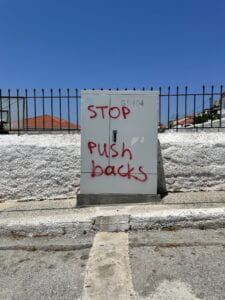Eric Raimondi, Still I Rise, Greece
Illegal and violent pushbacks, de facto detention, and the exclusion of civil society: these are central fixtures of the Greek asylum system. Why is this allowed to happen? Even in the European Union, which has one of the most comprehensive human rights legal frameworks in the world, there is a complete disregard of human rights of those seeking asylum.

In the last few weeks of my internship, I have been physically present on the island of Samos in Greece, where a new Closed and Controlled Access Center, financed by the European Union and managed by the Greek Government, has been built. As part of both my internship and academic research, I have been conducting one on one interviews and collecting testimonies from asylum-seekers and refugees living inside the new enclosed center, local residents living in the town of Vathy near the camp, and employees from both international and Greek civil society organizations.
It is clear that in Samos, migration is becoming increasingly criminalized, the repercussions of which are being felt both by refugees and the people that aim to assist them. Through the interviews I conducted and the testimonies I collected, I learned about the exclusionary policies that Greece is implementing in order to deter migration and segregate refugees and asylum-seekers from civil society and urban spaces. I also recorded numerous accounts that demonstrate practices of physical abuse and violence done by the Hellenic Armed Forces, the Hellenic Police, the Greek Coast Guard, and the European Border and Coast Guard Agency (Frontex).

With these testimonies and interview transcripts, I aim to conduct a thorough analysis of the changing conditions of migration management in Greece and its potential implications for migration management more broadly throughout Europe. With Still I Rise, I am drafting a position paper that will draw connections between the Greek context and the EU 2020 Pact—the new migration pact which includes similar features to the Greek asylum system. This position paper will ideally serve as a platform from which to more effectively advocate for refugees and asylum-seekers and will address the illegal practice of pushbacks, de facto detention, and the exclusion of civil society.